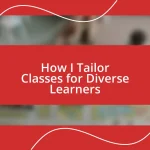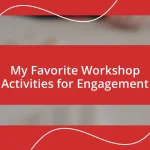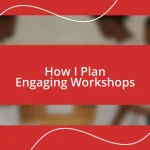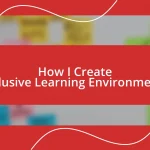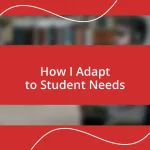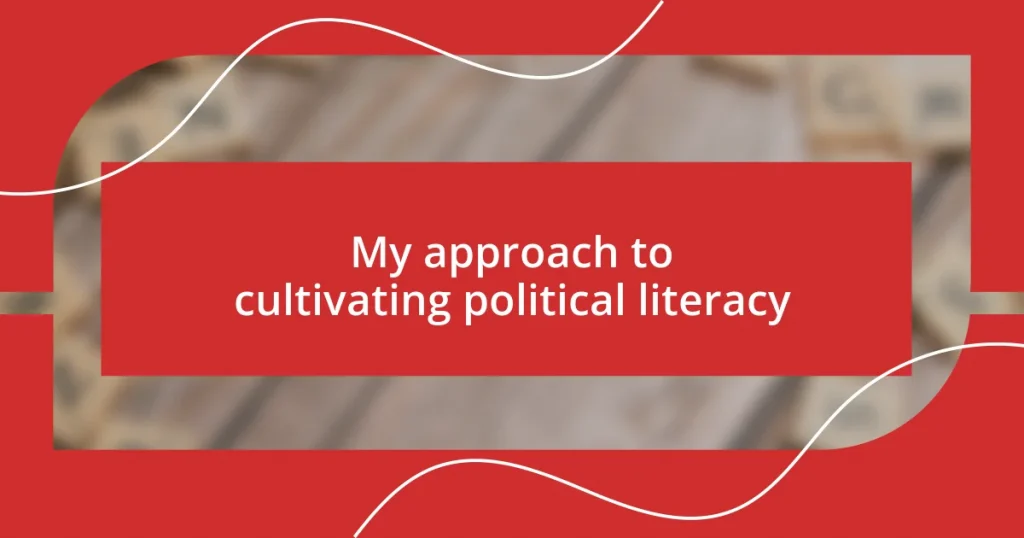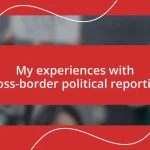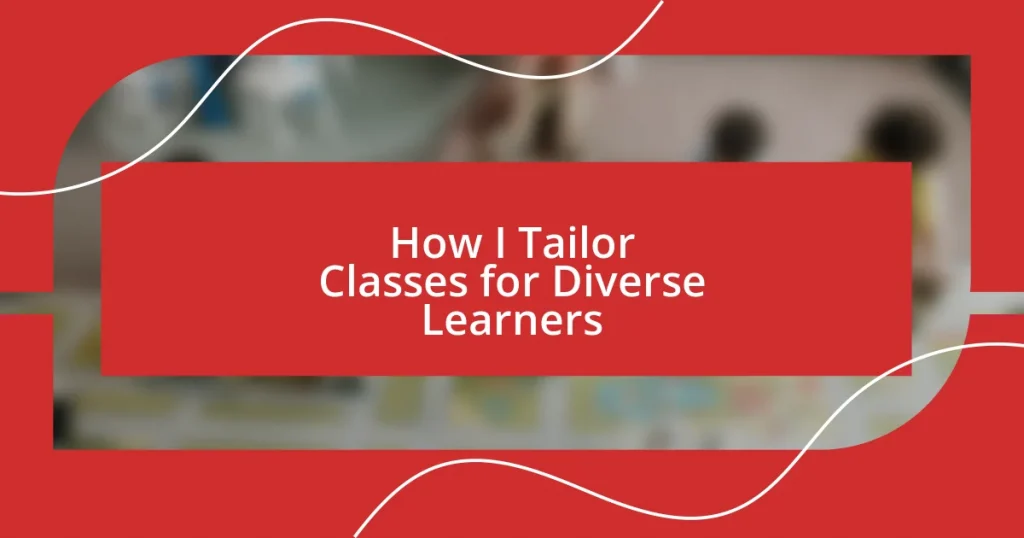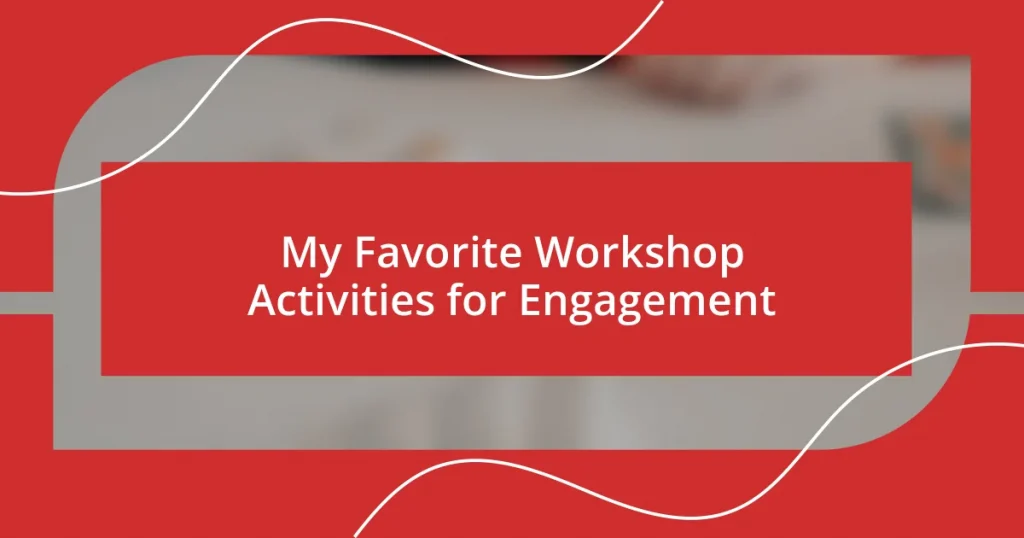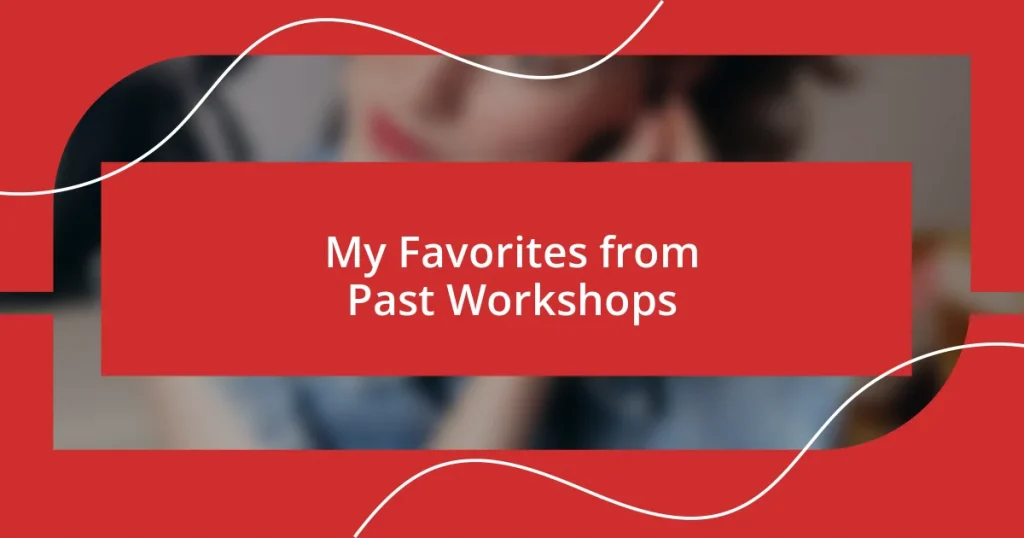Key takeaways:
- Political literacy involves understanding the real-life implications of political processes and engaging with information critically to combat misinformation.
- Engaging with diverse viewpoints fosters understanding and can transform political discussions into collaborative explorations of values and beliefs.
- Practical strategies such as grassroots activism, connecting with elected officials, and volunteering enhance political engagement and empower individuals to effect change in their communities.
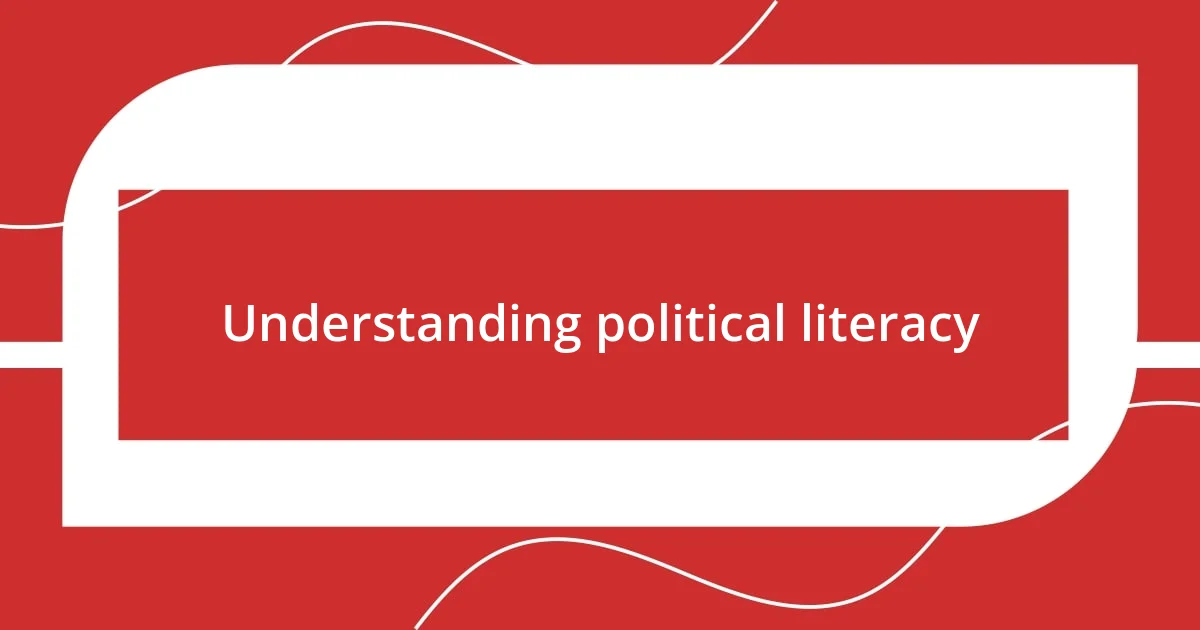
Understanding political literacy
Political literacy isn’t just about knowing the names of elected officials or understanding how a bill becomes law. It’s fundamentally about grasping the implications of these processes on our daily lives. I remember a time when I struggled to comprehend how local legislation impacted my community; once I connected the dots, everything felt different. Have you ever felt that disconnect between your life and political events around you?
Understanding political literacy means being able to critically evaluate the information you encounter, especially in our digital age. One moment, I was scrolling through social media, bombarded with headlines and opinions, feeling overwhelmed. It took conscious effort to sift through misinformation—much like digging through sand to find a hidden gem. Isn’t it vital to ask ourselves how we can better engage with the information that feeds our understanding of civic responsibility?
I also believe that political literacy involves recognizing the power of our voices in shaping policy. There was a time when I hesitated to speak up in community meetings, believing my perspective was insignificant. I soon realized that every voice matters, and our collective narratives can drive real changes. How often do we underestimate the impact we can have when we engage with our political environment?
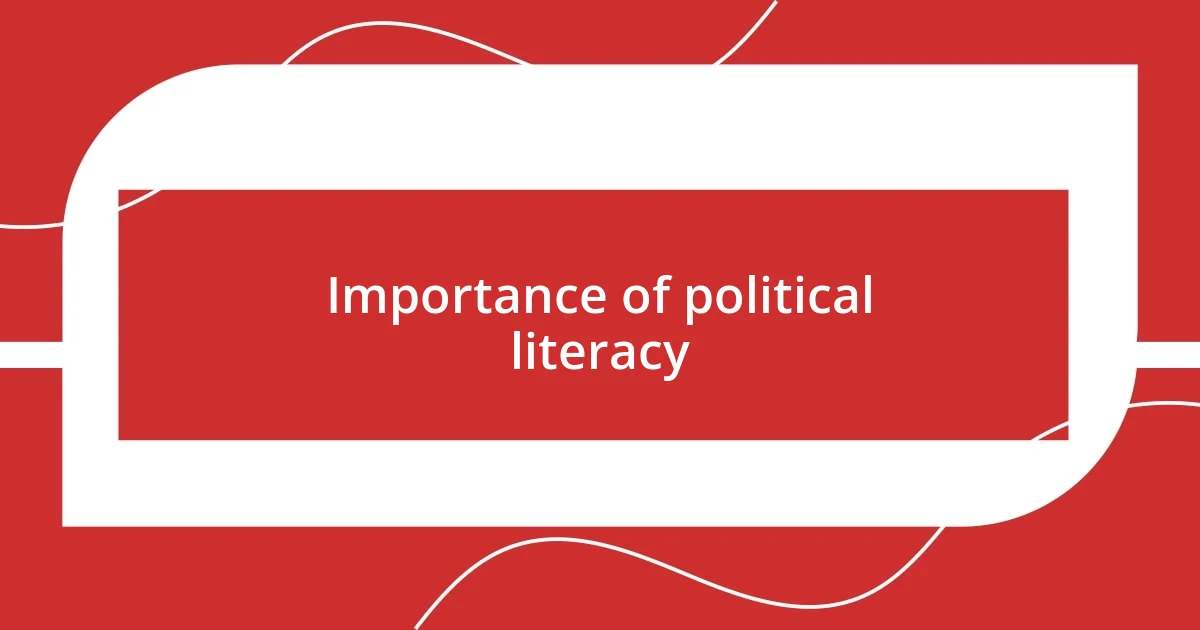
Importance of political literacy
Political literacy is crucial because it empowers individuals to make informed decisions that impact their lives and communities. I’ve watched friends fall into the trap of misinformation, frustratingly shouting their opinions without understanding the facts. It’s a stark reminder of how vital it is for each of us to engage deeply with political issues. When people are politically literate, they can actively participate in democracy, advocating for their beliefs with confidence and clarity.
Here are a few reasons why political literacy matters:
- Informed Decision-Making: Understanding political processes allows for better choices during elections and policy discussions.
- Community Engagement: Politically literate individuals are more likely to get involved in their local issues, fostering stronger communities.
- Critical Thinking: It promotes critical analysis of news and information sources, helping to distinguish between fact and opinion.
- Empowerment: Awareness of one’s rights and responsibilities enriches civic engagement and inspires advocacy for change.
Reflecting on my own journey, I remember attending a town hall meeting where I finally grasped the nuances of local governance. It was an eye-opening experience that sparked my passion for civic engagement. Seeing how an engaged community grapples with issues, I felt an exhilarating sense of purpose. It was clear to me that understanding the intricacies of political systems not only enhances personal empowerment but also cultivates a society that thrives on informed dialogue and collaboration.
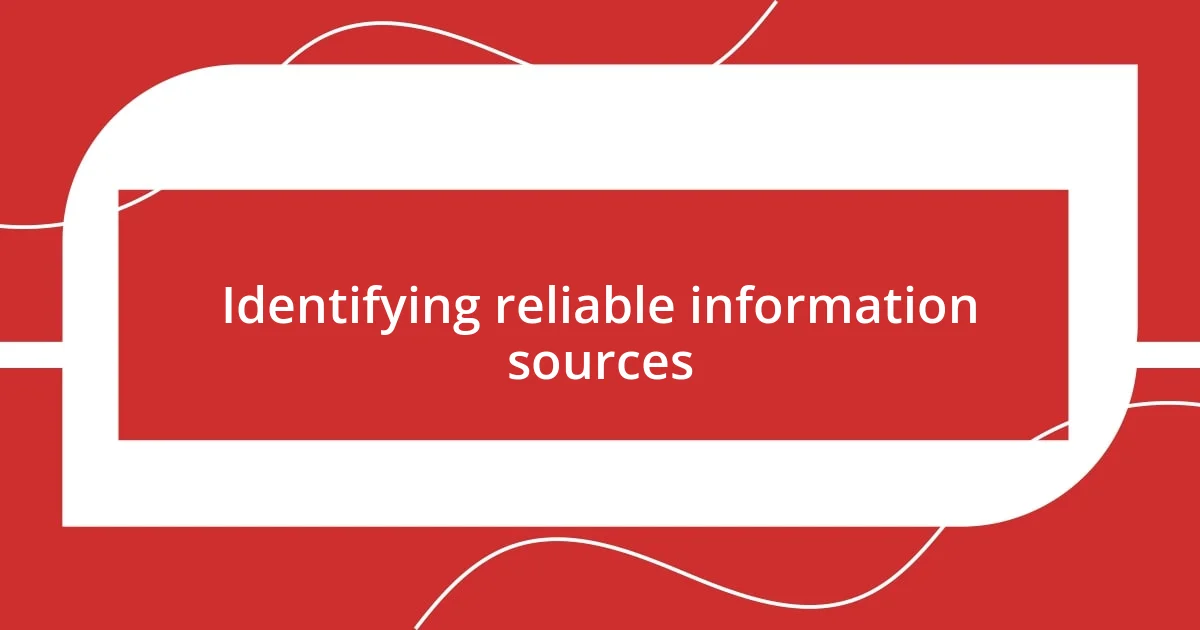
Identifying reliable information sources
Identifying reliable information sources can feel like navigating a minefield, especially in our fast-changing digital world. I recall a time when a viral video on social media caught my attention, claiming an imminent political crisis. After a few moments of panic, I decided to verify the claims. It was a lesson learned—always cross-check, especially when the stakes seem high. Reliable sources often present well-researched and balanced views, rather than sensational headlines designed to provoke immediate emotional reactions.
To make this process easier, I developed a habit of checking the credentials of the sources I read. It’s essential to consider whether the author has expertise in the subject and if the organization follows strict editorial standards. In my experience, reputable news outlets will link to their sources, allowing you to explore the foundation of their claims. This transparency not only builds trust but also facilitates a deeper understanding of the issues at hand. Isn’t it fascinating how the right source can shift your perspective entirely?
Comparing different sources can also illuminate biases or gaps in reporting. When I engage with multiple viewpoints, I often discover underlying themes that enrich my understanding of complex issues. For instance, while researching a recent environmental policy, I read articles from both scientific journals and local news. The juxtaposition helped me see the broader narrative and recognize how information can be framed differently depending on the audience. Establishing a wide array of reliable sources truly enhances our political literacy.
| Source Type | Characteristics |
|---|---|
| Academic Journals | Peer-reviewed, rigorous research, high credibility |
| Credible News Outlets | Fact-based reporting, transparency in sources, established reputation |
| Government Websites | Official data, lawful context, often updated |
| Nonprofit Organizations | Advocacy-focused, may have specific agendas, usually detailed reports |
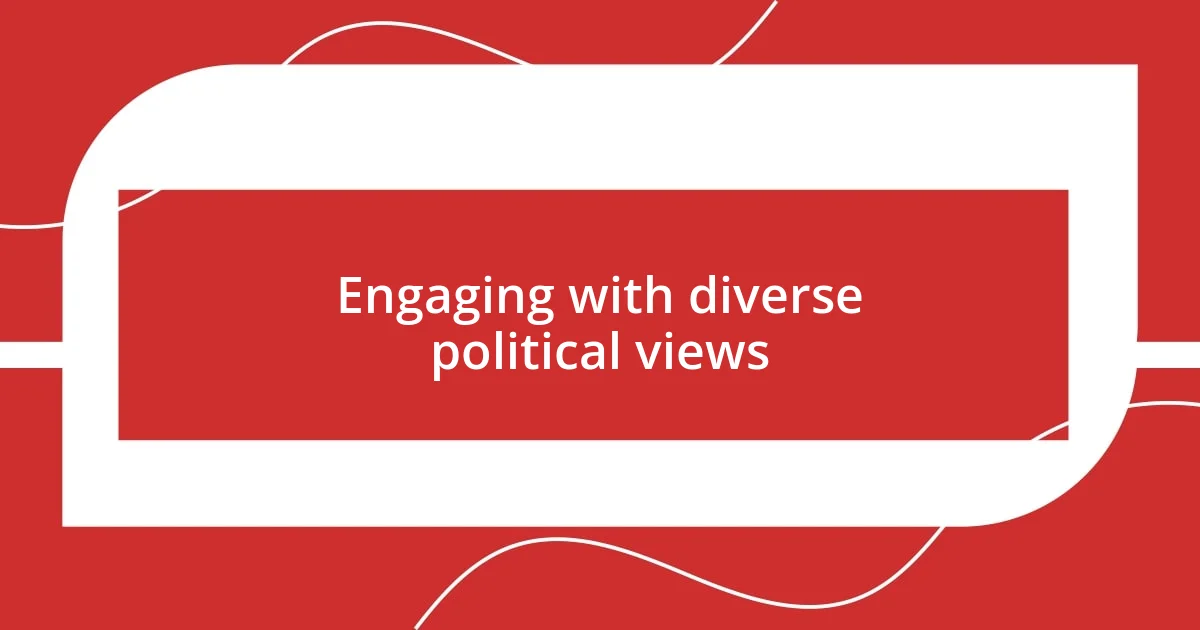
Engaging with diverse political views
Engaging with diverse political views has been a transformative experience for me. I recall sitting at a family gathering where conversations took unexpected turns, often delving into starkly contrasting beliefs. At first, it was uncomfortable, but I soon realized that truly listening to others’ perspectives enriched my own understanding. Have you ever found that discussing different viewpoints opens up new avenues for thought? It often surprises me how much I learn when I’m open to hearing differing opinions.
I firmly believe that engaging with diverse views doesn’t mean I have to agree with them; rather, it’s about understanding the ‘why’ behind those perspectives. There was a time when my neighbor, a staunch advocate for a policy I opposed, and I decided to have a cup of coffee and discuss our beliefs openly. That conversation uncovered layers to his stance that I hadn’t considered before. Suddenly, what seemed like a rigid political divide became a dialogue steeped in personal experiences and values. It’s moments like these that highlight that politics is as much about our stories as it is about the policies themselves.
Admittedly, sometimes I approach these conversations with trepidation. What if our discussion escalates into an argument? Yet, I’ve learned to frame my inquiries differently. Instead of challenging outright, I often ask, “What experiences led you to this belief?” This simple question not only diffuses tension but also invites a deeper exploration of our differences. It’s fascinating to see how a thoughtful approach can create space for genuine connection, even across ideological divides. What about you? How do you navigate discussions with those who hold differing views?
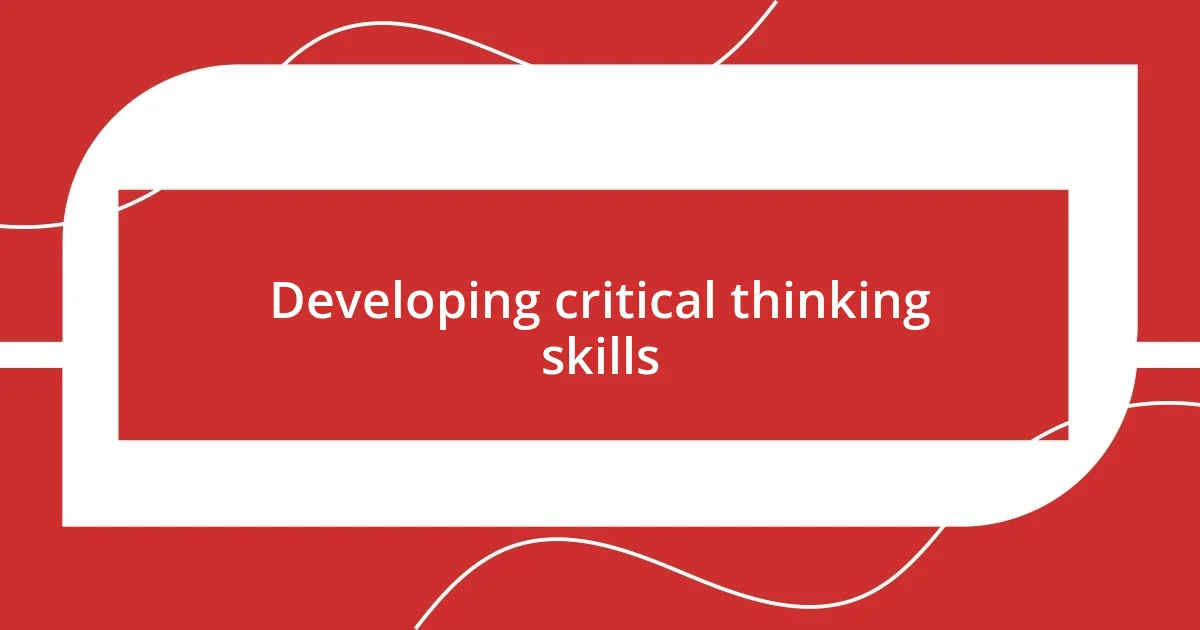
Developing critical thinking skills
Developing critical thinking skills is an essential part of navigating today’s complex political landscape. I remember a discussion I had with a colleague who insisted that a particular policy would lead to disaster. Instead of accepting their assertion, I asked them to explain their reasoning. This not only encouraged me to think critically about the argument but also allowed us to investigate the underlying facts together. Have you ever found yourself challenging assumptions in a conversation?
I strive to approach information with an analytical mindset. For instance, when I encounter a claim that seems too outrageous to be true, I make it a point to dissect it. I break down the evidence, scrutinize the logic, and even evaluate the emotional appeal. This process has helped me differentiate between genuine arguments and those fueled by hyperbole. It’s surprising how often a little critical thinking can expose flaws in arguments that initially sound convincing.
Moreover, I’ve learned that empathy plays a role in critical thinking. When I engage with opposing views, I often reflect on what biases influence my own perspective. For example, during an online debate, I realized my responses were rooted in my personal experiences rather than objective analysis. This awareness prompted me to reconsider my approach, allowing for a richer and more balanced understanding. Isn’t it interesting how our own stories can both illuminate and obscure our comprehension of political issues?
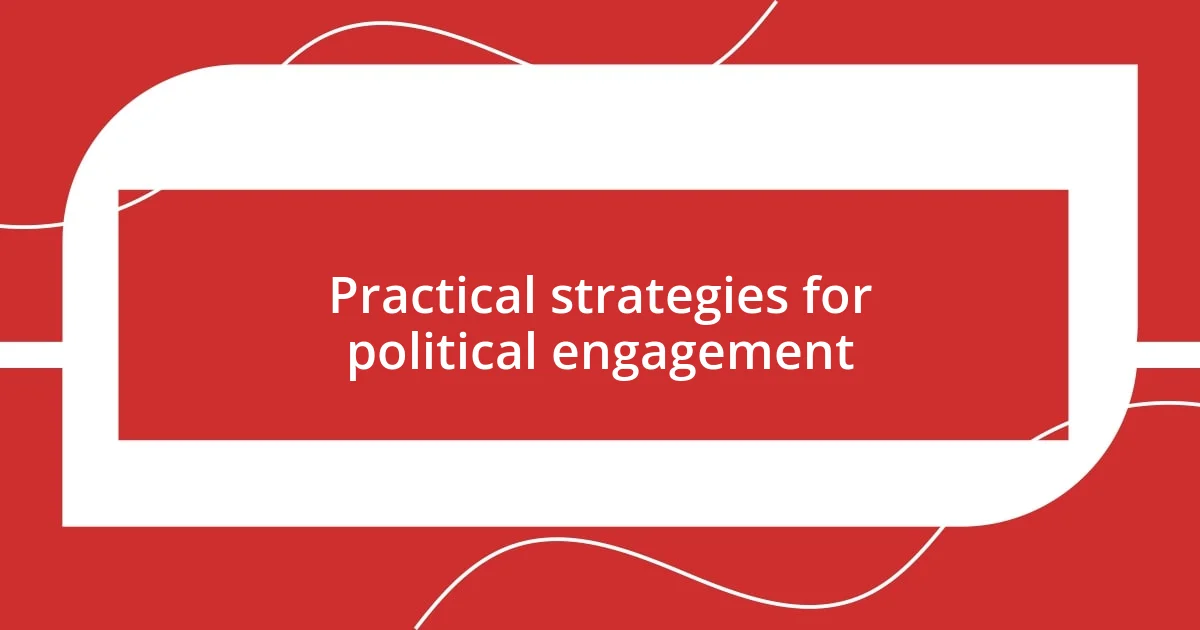
Practical strategies for political engagement
When I think about practical strategies for political engagement, I cannot overlook the power of grassroots activism. A few years back, I joined a local campaign for a community-based initiative. Engaging with passionate volunteers ignited my own enthusiasm for political change. Have you ever experienced how being part of a collective effort can inspire you to dig deeper into issues you care about? Working alongside others allowed me to see the tangible impact we could make, nurturing a sense of empowerment that’s invaluable in the political sphere.
Connecting with my elected representatives has also been a game changer. I remember drafting a well-thought-out email expressing my concerns about environmental policies. Surprisingly, I received a thoughtful response that acknowledged my views. It reminded me that our voices matter, and they can influence decision-makers. Have you reached out to your representatives yet? It might feel daunting at first, but these interactions can pave the way for meaningful dialogue and show our leaders that we are paying attention.
Volunteering in community organizations is another effective way to deepen political engagement. Once, I spent a weekend helping out at a local food bank, which opened my eyes to the socio-economic issues many face daily. That experience sparked my interest in social justice advocacy. Have you thought about how such hands-on activities can connect you more profoundly with political realities? I’ve learned that the more I engage at a community level, the better equipped I am to advocate for policies that truly reflect the needs of those around me.
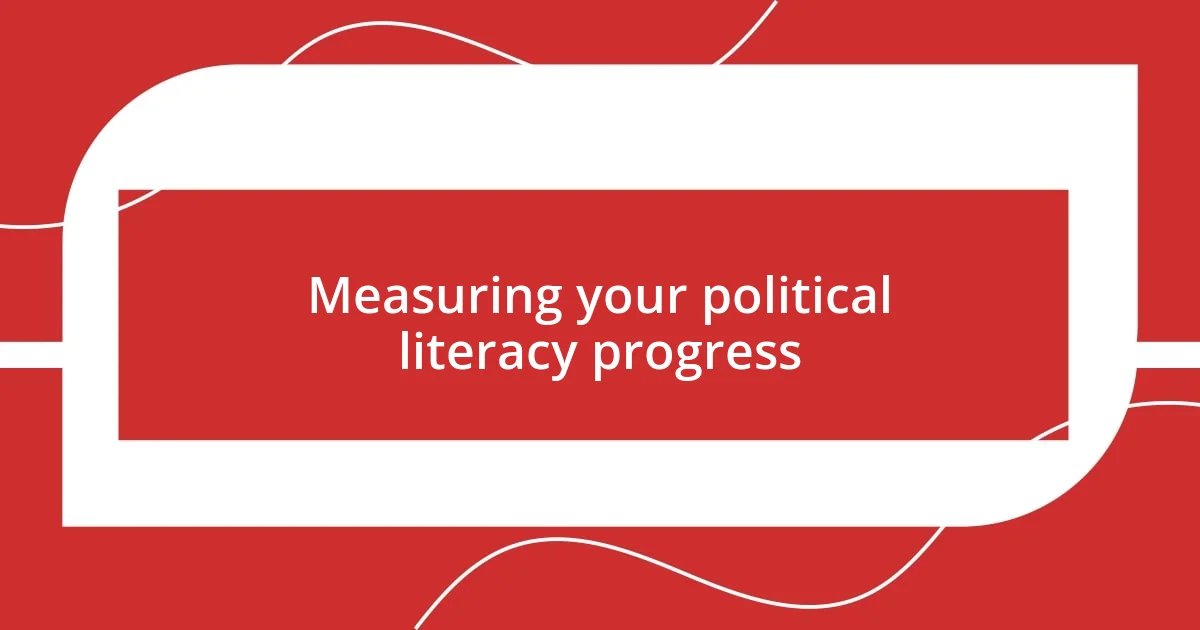
Measuring your political literacy progress
Tracking your political literacy progress can be as enlightening as it is essential. I remember the first time I took a simple quiz online about current events—I was surprised to discover gaps in my knowledge. It prompted me to dive deeper into those areas and revisit the resources I had overlooked. Have you ever assessed your knowledge objectively and realized how much more there is to learn?
One approach I find effective is keeping a personal journal of my political insights and reflections after engaging with news articles or discussions. A few months ago, I noted how my understanding of a specific policy evolved through conversations with friends who held diverse opinions. Revisiting those entries has been a powerful way for me to visualize my growth and identify areas for further exploration. Do you track your thoughts, or do you let them drift away after conversation?
Feedback is another valuable tool for measuring progress. When I engaged in a community forum, the reactions to my contributions offered insight into how well I articulated my understanding of issues. Interestingly, some members challenged my views, which initially felt uncomfortable, but it ultimately highlighted how important it is to embrace constructive criticism. Have you sought feedback on your political insights? It can be a powerful catalyst for growth.
